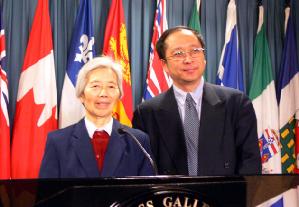(Clearwisdom.net) The Human Right Tribunal of Ontario ruled on April 27, 2011 that the Ottawa Chinese Senior Association (respondent) breached the Ontario Human Rights Code and discriminated against Ms. Daiming Huang (complainant) on the basis of her belief.
Ms. Huang is 78 years old. She immigrated to Canada in 1992 and started to practice Falun Gong in 1998. After practicing, her illnesses of sinusitis and spondylolisthesis were all gone. Huang was attending a New Year’s celebration at the Chinese Senior Association on December 29, 2001, when she noticed that a Chinese Embassy official in attendance was looking at her. Minutes later, the secretary of the association, Feng Xu, approached her and told her that the board of directors had decided that they would no longer accept Falun Gong practitioners.
When she returned in February for a Chinese New Year celebration and to ask the chair about the decision to cancel her membership, she was berated by other board members who said that she was part of a group banned in China while seniors visiting the center looked on.
This case is about Ms. Huang's involvement with the corporate respondent, the Ottawa Chinese Senior Association, a social organization composed mainly of seniors who are new immigrants from China. The personal respondents were members of the Association’s governing body (“Council”): Shen Guo was the Association’s president and Feng Xu was its secretary.
The Tribunal made an earlier decision on this case on January 18, 2006 when the Ottawa Chinese Senior Association representatives were intentionally absent. The Association thought that the ruling was not fair, and appealed. The tribunal requested witnesses from both sides to provide evidence. However, association members Feng Xu and Shen Guo did not show up for the tribunal hearing as scheduled on January 19, 2011. Feng Xu went to China before her scheduled appearance.
Mr. Michelle Flaherty, Vice Chairman of the Tribunal ruled, “The Falun Gong is a creed and the Association offers a service within the meaning of the Ontario Human Rights Code. I conclude that the respondents breached the Code and discriminated against the complainant on the basis of her creed. The Tribunal orders the corporate respondent to pay the complainant the sum of $15,000 for loss arising from the infringement of her rights under the Code.
“I find that, in the circumstances of this case, an award of $15,000 is appropriate. In making this award, I am mindful that the discrimination was public and caused the complainant to lose face within her community.
“In this case, the discrimination is two-pronged: it involved both the revocation of the complainant's membership and comments made publicly when the complainant sought to discuss the Association's decision to revoke her membership. Further, I accept that the complainant is more vulnerable because she is part of a group that has been subjected to persecution. I have taken this into account in making the award.
“Having found that the respondents violated the Code, the Tribunal makes the following orders:
a. Within 30 days of the date of this Decision, the corporate respondent shall pay the complainant $15,000 for the injury to her dignity, feelings and self-respect arising from the infringement of her rights under the Code;
b. Within 30 days of the date of this Decision, the corporate respondent shall write to the complainant and invite her to join the Association.”
Two Chinese Christians living in Ottawa provided witness for this case on the basis of their conscience. They witnessed that the Association conducted a signature collection against Falun Gong in Dows Lake Park in May 2001 and rejected Falun Gong practitioners in the Chinese Center in February 2002.
Ms. Daiming Huang at a press conference on January 18, 2006
“This is not just a success for Daiming Huang, it is a victory in the worldwide battle against the Communist Party’s oppression of Falun Gong,” said David Matas, legal counsel for Huang.






